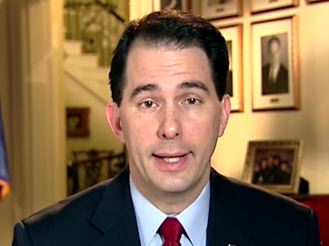 Gov. Scott Walker
Gov. Scott Walker
MADISON, Wis. (AP) -- Wisconsin's Republican governor and GOP leaders in several other states are facing increasing pressure to back off from deep spending cuts to education and social programs in light of higher than expected revenue projections as the economy improves.
The surge in revenue is giving rise to an awkward question - are the governors making the deepest cuts because they have to or because they choose to?
The issue is unfolding in Michigan, Ohio, New Jersey, Colorado and several other states where tax revenue forecasts have turned up just as legislatures are working through budget reduction packages.
In Wisconsin, local school board members and superintendents are pressing lawmakers and Gov. Scott Walker to scale back his proposed 8.4 percent cut in aid to public schools and 5.5 percent reduction in how much schools can collect from state money and property taxes combined. The Republican-controlled Legislature has backed Walker's agenda so far, but did not reject this appeal outright.
Miles Turner, director of the Wisconsin Association of School District Administrators, said the earlier cutbacks were based on a leaner budget outlook. Continuing with the entire reduction now, he said, would show "there's a greater interest in following through with an ideological campaign against public education than there is to support public education."
Many school districts have been planning to lay off teachers, increase class sizes and cut back programs like music and foreign languages to cover the reductions.
Elsewhere, the Colorado Legislature has approved $22.5 million less in education cuts than originally proposed by Democratic Gov. John Hickenlooper following improvements in the state's revenue projections. In Michigan, Republicans who control the Legislature and Republican Gov. Rick Snyder are reducing their original proposed cuts to schools by as much as two-thirds.
A similar effort isn't getting much traction in New Jersey where Republican Gov. Chris Christie has refused to back off his program of cuts although revenues are projected to increase between $500 million and $900 million over two years.
Tax revenue projections in Wisconsin were revised last week to show the state will receive $636 million more through the end of the budget cycle than expected. The increase amounts to only 1.6 percent, but would be enough to reduce layoffs and cuts in school programs. Milwaukee, the state's largest school district, expects to eliminate about 1,000 fulltime teaching and staff positions.
Republican Sen. Alberta Darling, co-chair of a budget committee, said Republicans were considering softening the cuts for some schools that would be hurt the most. She wouldn't say how much of Walker's cuts might be rolled back.
She and other Republican leaders also no longer plan to go along with Walker's plan to change a popular prescription drug program for seniors. Walker had targeted that program for $15 million in savings.
But education advocates say they doubt the Legislature will pull back as much as it could. They charge that Walker and his conservative allies want to reduce support for public schools as part of a larger goal of expanding school vouchers and curtailing the public sector.
"It's pretty clear there's a real reluctance to spend on schools," said Joe Quick, government relations specialist for the Wisconsin School Boards Association. "The goal is to hold property taxes down."
When Walker unveiled his budget, he said the deep reductions were necessary because the state could no longer afford all of its programs and expenses. "It's time to start paying our bills today so our kids are not stuck with even bigger bills tomorrow," he said in March.
When Wisconsin received the rosier budget news last week, Walker was quick to say the extra money should go to pay down the state's debts. Wisconsin faces a $3 billion shortfall, down from the earlier $3.6 billion projection. The state has added 25,000 private sector jobs since January as the economy improves.
Walker said Friday that school districts can soften the budget blow by managing their employee health insurance and pension costs better. "We're not cutting without giving options," he said. Republican budget committee co-chair Rep. Robin Vos insisted the deep cuts were still necessary, and not just to fulfill conservatives' small-government ideology. "The ideology is about balancing the budget," he said.
Walker hasn't completely shut the door on revisiting some of his proposed cuts. But with one of the most expansive veto powers of any governor in the country, he has wide latitude to reject changes the Legislature might make.
Walker isn't the only governor holding the harder line. In Ohio, Republican Gov. John Kasich said he isn't backing off his budget cutting plans, even though the economy is his state is improving. Any increased revenue would go toward cutting taxes, he said.
- Home
- News
- Opinion
- Entertainment
- Classified
- About Us
 MLK Breakfast
MLK Breakfast- Community
- Foundation
- Obituaries
- Donate
04-23-2024 12:27 pm • PDX and SEA Weather




















































































































































































































































































































